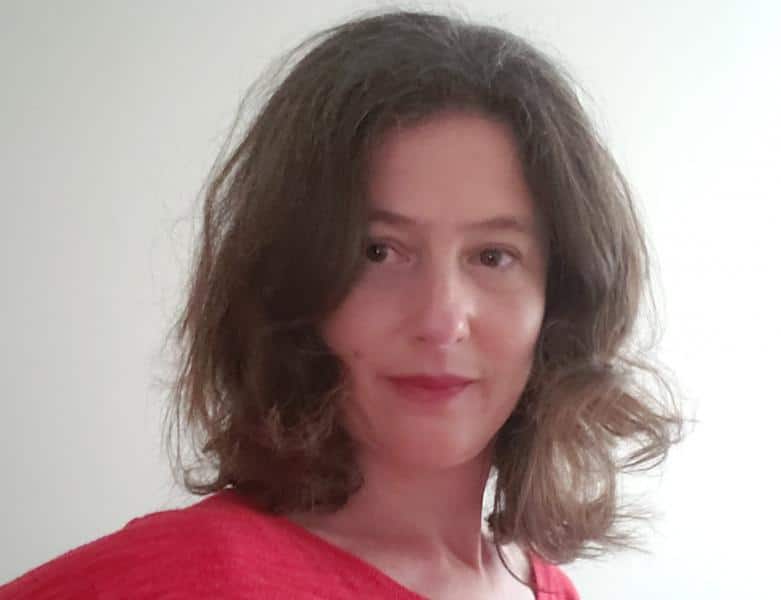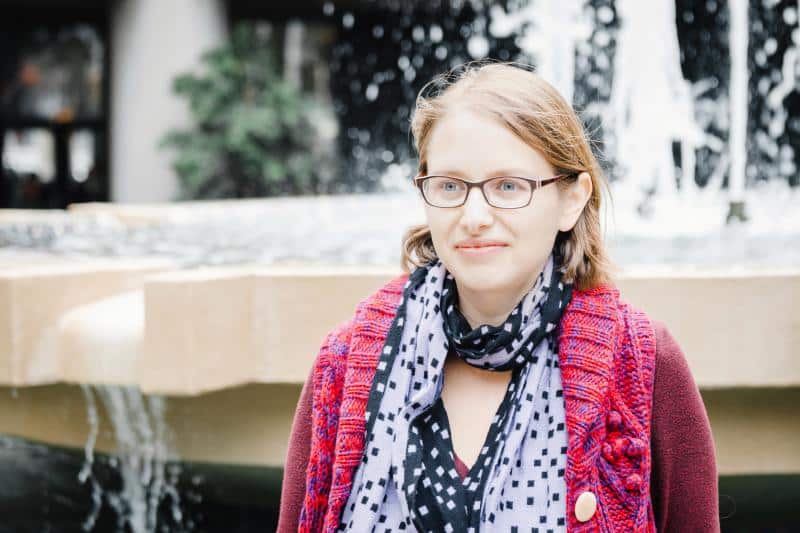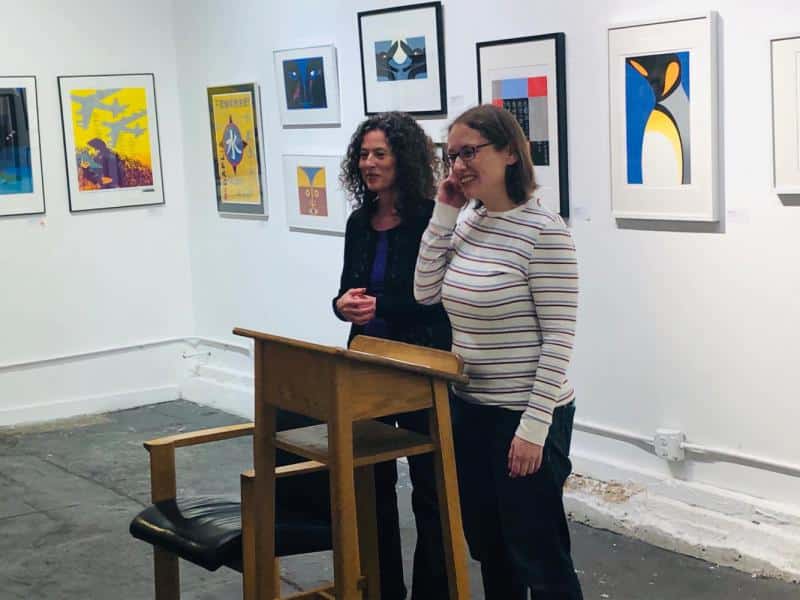
Yelena Furman and Olga Zilberbourg
Yelena Furman is a Lecturer at UCLA, and Olga Zilberbourg is a Russian-American bilingual writer.
1. When did you first develop an interest in Slavic, East European and Eurasian Studies?
YF: I was born in what used to be the Soviet Union, and my Jewish family immigrated to the U.S. as part of the Third Wave when I was young. I grew up reading Russian books because they were quite literally my way of staying connected to Russian language and culture, which also meant staying connected to that part of myself. My life’s path was pretty much determined early on. (Pictured top right)
OZ: My aunt Maya Konstantinovna Ovsyannikova worked as a librarian at the St. Petersburg State University, and as a child I used to visit the library and help her prepare the admissions cards for her readers. My aunt had studied at the same university with Nina Ivanovna Popova and Isanna Mikhailovna Lurie, who later formed the core team of the Akhmatova museum in Petersburg and for many years ran the programming there. After the fall of the Soviet Union, when we saw the publication of previously censored books, my aunt pointed me to the diaries of Lydia Korneevna Chukovskaya. Akhmatova and Chukovskaya’s work ultimately became my guide to the history and literature of the 20th Century. In 2004, I enrolled in an MA program in Comparative Literature at the San Francisco State University, where I got a chance to engage with their work at a professional level. (Olga’s photo middle right).
2. What support have you received throughout your career (from ASEEES / other societies / federal support / etc.) that has allowed you to advance your scholarship?
YF: As a graduate student in Slavic, I received grants such as FLAS and ACLS, as well as support from UCLA, both from my department and the university. My dissertation advisor was Michael Heim, and I received several fellowships to work with him on my dissertation on writing the body in contemporary Russian women’s fiction, including one for research in Moscow, where I got to interview some of the writers. He was also responsible for making it so that I was able to teach my own course on this topic in the department. I’m now an instructor there and teach a revised version of this class and have published articles that came out of my dissertation. I am so deeply grateful to have had him as my advisor and mentor, and maybe this is one small way to honor his memory.
As a non-TT faculty member, I have also received funding from my department as well as the Dean’s Fund at UCLA for conference travel grants (unfortunately, not a given for non-TT instructors at many institutions). This makes it possible for me to attend ASEEES, where I’ve presented papers and organized panels. Some of my publications are a direct result of this conference participation, as was a lecture I was invited to give in Uppsala University (Sweden) a few years ago. And last year, because the conference was in San Francisco where Olga lives, I finally got to meet her in person and take part in a reading she organized where we got to introduce Punctured Lines and several of us also read our own fiction and/or translations. She also came to my panel at ASEEES, which was the first time a writer I was talking about in my paper sat next to me.
OZ: My career has been largely non-academic—I’m primarily a creative writer; that said, I do want to acknowledge the deep gratitude to women in academia and in publishing who have helped to foster and direct my work. Though I express my thoughts in fiction, I learn and develop my ideas by reading secondary literature, by participating in academic conferences as an independent scholar, and by maintaining a dialogue with scholars who can help me to focus my research.
At SFSU, I have worked closely with professors Ellen Peel and Katia Siskron who have helped me to develop my ideas about feminism and find my voice in writing about Lydia Chukovskaya, among others. Galina Alekseevna Solovyova, an editor and translator at Azbuka publishing house in St. Petersburg has helped me to find a path to publication. Last but not least is Olga Andreeva Carlisle, whose family scholarship has funded my participation in a literary conference. Together with her husband Henry Carlisle, Olga translated and published in the US several important Russian and Soviet books, including playing a key part in bringing the work of Solzhenitsyn to English-speaking audiences. In the past decade, she became a friend and a mentor and has helped me to deepen my understanding of the interrelationships between Soviet and American writers and literary figures during the Cold War.
3. What is your current research/work project?
Our current joint project is of course Punctured Lines https://puncturedlines.wordpress.com/ PL is the result of our wanting to fill a particular gap in discussions of Russian/ex-Soviet literature. As we note on the blog, “As Russian-Jewish immigrants to the U.S., we are invested in cultural, linguistic, and geographical hybridity. ‘Punctured Lines’ describes our hope to complicate essentialist views of identity and to read across borders. Our outlook is feminist, and we particularly want to amplify traditionally under-represented voices.” One of our recent posts was Notable Books: Russian Titles in English Translation, 2009-2019, which was a round-up of titles by women in prose, poetry, and other categories. We’ve also done several Q&As with women writers, including Lara Vapnyar and Olga Livshin. Punctured Lines is intended to foster a sense of community, and we encourage those interested in contemporary literatures of the former Soviet Union and its diasporas to take a look at our submission guidelines and let us know if they would like to contribute.
YF: My academic research focuses on Russian-American fiction, which is works by Russian Jewish immigrants, such as Lara Vapnyar, Irina Reyn, Anya Ulinich, et al., who write in English on Russian-related themes. Unsurprisingly, a lot of what Russian-American fiction deals with is Russian immigrant experiences and hybrid cultural and linguistic identities, which means that our particular immigrant narrative – and there isn’t one, of course, but many – is now being represented in literature. I also write book reviews, mainly for the Los Angeles Review of Books, courtesy of the uber-talented Boris Dralyuk, a friend and former colleague from UCLA. And recently I’ve gotten back to writing fiction. Thanks to Olga, who has my undying gratitude for this, I got my first short story, “Naming,” published in Narrative last year https://www.narrativemagazine.com/issues/winter-2020/fiction/naming-yelena-furman
I’m now working on more. Given how prominently they all feature references to Russian literature, my creative writing and my academic writing aren’t that far from each other, which means I have a one-track mind, but it feels right.
OZ: This fall, my English-language debut, LIKE WATER AND OTHER STORIES, was published by California-based WTAW Press https://www.wtawpress.org/product-page/like-water-and-other-stories In this collection of 52 short pieces, I tell stories—often humorous—of women who struggle to hold together their many identities. Many of my characters are immigrants and new mothers, and most of them grapple with the lingering trauma from the fall of the Soviet Union. I’m currently at work to help prepare this book for publication in Russia, where this will be my fourth published collection of stories. I’m working with translators and writing new content for the Russian version. I’m also continuing to write new fiction and have started working on a memoir project about coming to the US in 1996 on my own, as a seventeen-year old college student.
4. What does your ASEEES membership mean to you? How has your involvement with ASEEES helped to further your career?
YF: It means being able to exchange ideas and get feedback from my colleagues at the annual conferences and keeping up with developments in my field. And given that we are all under quarantine right now, ASEEES’s virtual presence via its website is keeping us connected. Answering this Q&A also feels like a way to connect with other Slavists and anyone interested in Russian literature.
OZ: Attending ASEEES conference was a highlight of my year! It allowed me to meet Yelena with whom we had only been connected via Twitter before, and to host a literary reading in San Francisco, where I happen to live, inviting scholars and translators who traveled to the conference to present their literary work. This was an amazing opportunity to bring something of post-Soviet literature to my community. I attended a number of the conference panels as well, which allowed me to take the pulse of what topics scholars are currently engaged with in the field. As a creative writer, I treasure the attention with which the scholars treat the texts they study and I revel in the insights that academic conversations have to offer. I take copious notes during these sessions and draw inspiration from them for my fiction.
5. What do you believe is the most important impact ASEEES has on the field?
YF: Serving as a kind of central organizing space for Slavists from all the various parts of the world.
OZ: My view is very much that of a deeply interested outsider, and what struck me the most during the conference is the degree and depth of the cross-cultural and cross-border participation. I loved, for instance, the way panels on feminism that I attended brought together scholars from a broad spectrum of post-Soviet countries and from all across the English-speaking world. This was very heartening to see, especially in today’s climate of growing nationalism.
6. Besides your professional work, what other interests and/or hobbies do you enjoy?
YF: Reading, which is also my professional work! Watching Law and Order, British murder mysteries, and figure skating. Travelling is a huge one, and I’m looking forward to the day it becomes possible again. There are so many places I still want to see and to show my son.
OZ: Reading must be it for me too. I’m particularly fond of feminist science fiction, and my favorite recent novel in that genre is N.K. Jamisin’s The Fifth Season. During the quarantine, I’ve been taking care of my two kids, 5 years and 21 months and I’m re-discovering my early passion for drawing and painting. I’m very good at witches! And as soon as my daughter stops eating the paints, I’m going to order my gouaches!


